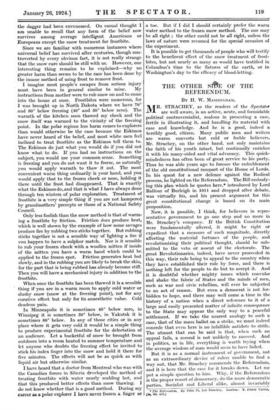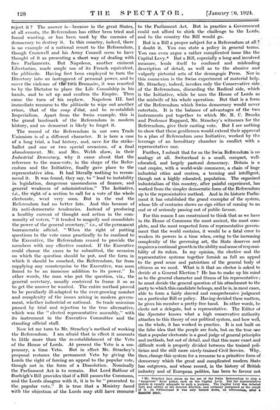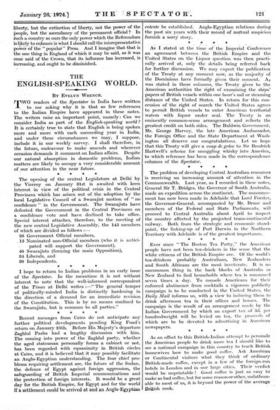THE OTHER SlikE OF THE REFERENDUM.
BY H. W. MASSINGHAM.
MR. STRACHEY, as the readers of the Spectator are well aware, is an active, acute, and formidable politieal controversialist, zealous in presenting a case, fertile in illustrating it, and handling its material with ease and knowledge. And he is a good, indeed a terribly good, citizen. Many public men and writers are warm converts but cold or feeble believers. Mr. Strachey, on the other hand, not only maintains the faith of his youth intact, but continually enriches it with his many-sided and vital advocacy. This quick- mindedness has often been of great service to his party. Thus he was able years ago to foresee the enfeeblement of the old constitutional rampart of the House of Lords. In his quest for a new defence against the Radical process, he lighted on the Referendum. The Bill embody- ing this plan which he quotes here,* introduced by Lord Balfour of Burleigh in 1911 and dropped after debate, was virtually his, and his present argument for this great constitutional change is based on its main proposition.
Now, it is possible, I think, for believers in repre- sentative government to go one step and no more in Mr. Strachey's company. If the British Constitution were fundamentally altered, it might be right or expedient that a measure of such magnitude, directly affecting the material fortunes of the people, and revolutionizing their political thought, should be sub- mitted to the veto or assent of the electorate. The great Revolutionaries, indeed, have never proceeded in this way, their rule being to appeal to the country when they have established their rule by force, and there is nothing left for the people to do but to accept it. And it is doubtful whether mighty issues which convulse and shake the fabric of States and the minds of men, such as war and civic rebellion, will ever be subjected to an act of reason. But even a democrat is not for- bidden to hope, and there may well come a time in the history of a nation when a direct reference to it of a large and easily presented matter of infinite consequence to the State may appear the only way to a peaceful settlement. If we take the nearest analogy to such a case,--that of the mass, ballot on a strike, we must indeed concede that even here is no infallible antidote to strife. The utmost that can be said is that, when such an appeal fails, a second is not unlikely to succeed. And in politics, as in life, everything is worth trying when the average wisdom of man would seem to have failed. , But it is as a normal instrument of government, not as an extraordinary device of rulers unable to find a way out, that Mr. Strachey commends the Referendum, and it is here that the case for it breaks down. Let me put a simple question to him. Why, if the Referendum is the proper resort of democracy, do the more democratic parties, Socialist and Liberal alike, almost invariably _*o The Referendum. By Icahn St, Loe Strachey. London : T. Mahar HuIdo, 1.84 6d. 'zeta reject it ? The answer is—because in the great States, at all events, the Referendum has either been tried and- found wanting, or has been used by the enemies of democracy to destroy it. In this country, indeed,' there is no example of a national resort to the Referendum, though Cromwell and his Army Council seem to have thought of it as presenting a short way of dealing with , free Parliaments. But Napoleon, another eminent Libertarian, made ample use of its French equivalent, the plebiscite. Having first been employed to turn the Directory into an instrent of personal power, and to cover the violence of tm igth Brumaire, it was resorted to by the Dictator to place the Life Consulship in his hands, and to set up and confirm the Empire. Then came the turn of his nephew. Napoleon III. had immediate recourse to the plebiscite to wipe out another crime, that of the coup d'etat, and to re-establish Imperialism. Apart from the Swiss example, this is the grand landmark of the Referendum in modern history, and no democrat is likely to forget it.
The record of the Referendum in our own Trade Unionism is of a different character. It is here a case of a long trial, a bad history, and, save for the strike- ballot and one or two special occasions, of a final abandonment. Mr. and Mrs. Webb show, in their Industrial Democracy, why it came about that the reference to the mass-vote, in the shape of the Refer- endum and the Initiative, finally gave place to the representative idea. It had literally nothing to recom- mend it. It was found, they say, to " lead to instability in legislation, dangerous unsoundness of finance, and ,general weakness of administration." The Initiative, i.e:, the right of a section to call for a vote of the whole electorate, went very soon. But in the end the Referendum had no better fate. And this because of its anti-democratic tendencies. Instead of producing a healthy current of thought and action in the com- munity of voters, " it tended to magnify and consolidate the power of the general secretary," i.e., of the permanent bureaucratic official. " When the right of putting questions to the vote came practically to be confined to the Executive, the Referendum ceased to provide the members with any effective control. If the Executive could choose the cases to be submitted, the occasion on which the question should be put, and the form in which it should be couched, the Referendum, far from supplying any counterpoise to the Executive, was soon found to be an immense addition to its power." In other words, the man who put the question, viz., the general secretary, usually contrived to frame it so as to get the answer he wanted. The entire method proved to be peculiarly ill-adapted to the ever-growing number and complexity of the issues arising in modern govern- ment, whether industrial or national. So trade unionism passed by trial and rejection to the true alternative, which was the " elected representative assembly," with its instrument in the Executive Committee and the standing official staff.
Now let me turn to Mr. Strachey's method of working the Referendum. I am afraid that in effect it amounts to little more than the re-establishment of the Veto of the House of Lords. At present the Veto is a sus- pensory, a time Veto. But in effect Mr. Strachey's proposal restores the permanent Veto by giving the Lords the right of forcing an appeal to the popular vote, though not in the form of a Dissolution. Nominally the Parliament Act is to remain. But Lord Balfour of Burleigh's Bill provides that if a Bill passes the Commons, and the Lords disagree with it, it is to be " presented to the popular vote.'_' It is true that .a Ministry faced' with the objection of the Lords may still have recoursb to the Parliament Act. But in practice a Government could not afford to shirk the challenge to the Lords, and to the country the Bill would go. _ But- is a Bill a proper subject for a Referendum at all et. I doubt it. You can state a policy in general terms.. You can even argue a rather complicated issue like the Capital Levy.* But a Bill, especially a long and involved measure, lends itself to confused and misleading description of detail, as well as to the abusive and vulgarly pictorial arts of the demagogic Press. Nor in this connexion is the Swiss experiment of material help. Mr. Strachey, indeed, invokes only the. Conservative side . of the Referendum, discarding the Radical side, which is the Initiative, while he uses the House of Lords as the midwife. of his whole operation. But that is a form of the Referendum which Swiss democracy would never entertain. It is the balance of advantages of the two instruments put together to which Mr. R. C. Brooks and Professor Rappard, Mr. Strachey's witnesses for the Referendum, give their casting vote. But I see, nothing to show that these gentlemen would extend their approval to a plan of Referendum sans Initiative, worked by the leverage of an hereditary chamber in conflict with a representative one.
Further, I submit that for us the Swiss Referendum is no analogy at all. Switzerland is a small, compact, well- educated, and largely pastoral democracy. Britain is a vast empire, with a world-wide commerce, a chain of huge industrial cities and centres, a teeming and intelligent, though not a highly educated, population. The organized industrialism of this country, after painful experiment, has worked from the simpler democratic form of the Referendum up to the representative. method.' And in its hiStOric Parlia- ment it has established the grand exemplar of the system, whose life of centuries shows no sign either of coming to an end or of seriously passing out of public favour.
For this reason I am constrained to think that as we have in the House of Commons the most ancient, the most com- plete, and the most respected form of representative govern- ment that the world contains, it would be a fatal error to weaken its powers in a time when, owing to the increasing complexity of the governing art, the State deserves and requires a continual growth in the ability and sense of responsi- bility of its rulers. In my opinion, the elective and the representative systems together furnish as full an appeal to the good sense and patriotism of the general body of citizens as we need. What is it that an elector is asked to decide at a General Election ? He has to make up his mind as to the general character and fitness of his representative ; he must decide the general question of his attachment to the party to which this candidate belongs, and he is, in most cases, able to form a fairly shrewd and comprehensive judgment on a particular Bill or policy. Having decided these matters, he gives his member a pretty free hand. In other words, he elects not a delegate, but a representative. The Editor of the Spectator knows what a high conservative authority attaches to this theory of our political system, and how well, on the whole, it has worked in practice. It is not built on the false idea that the people are fools, but on the true one that a popular electorate is a good judge of general principles and methods, but not of detail, and that this more exact and difficult work is properly divided between the trained poli- tician and the still more nicely-trained Civil Service. Why, then, change this system for a recourse to a primitive form of democracy which the great and complicated modern State has outgrown, and whose record, in the history of British industry and of European politics, has been to favour not • Hr. Strachey lays stress on the use of the Swiss Referendum to stop a "dangerous" fiscal policy, such as the Capital Levy. But the representative system Is equally adequate to such a purpose. The Capital Levy was debated fully and calmly at the General Election, and certainly postponed as the result of it. In Switzerland it was only turned down, on referendum, after 4 6444C141 panic, liberty, but the extinction of liberty, not the power of the • people, but the ascendancy of the permanent official ? In Such a country as ours the only power which the Referendum is likely to enhanee is what I should eallthe misrepresentative . _ power of the " popular" Press. And I imagine that that is the one thing in England of which it may be said, as it was once said of the Crown, that its influence has increased, is increasing, and ought to be diminished.




































 Previous page
Previous page